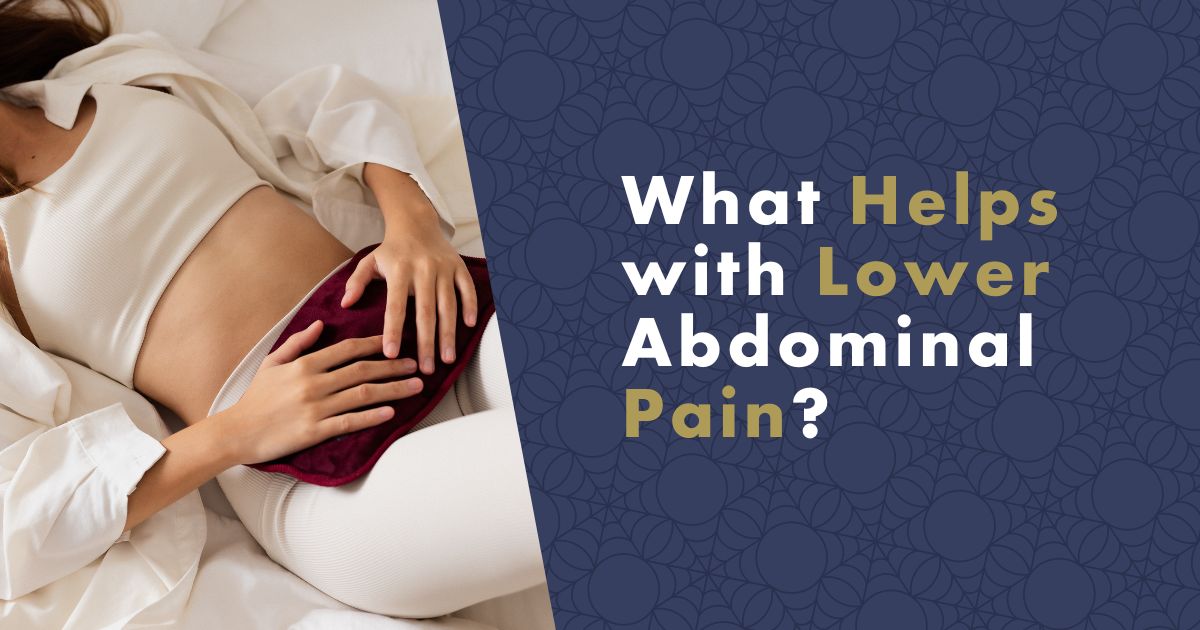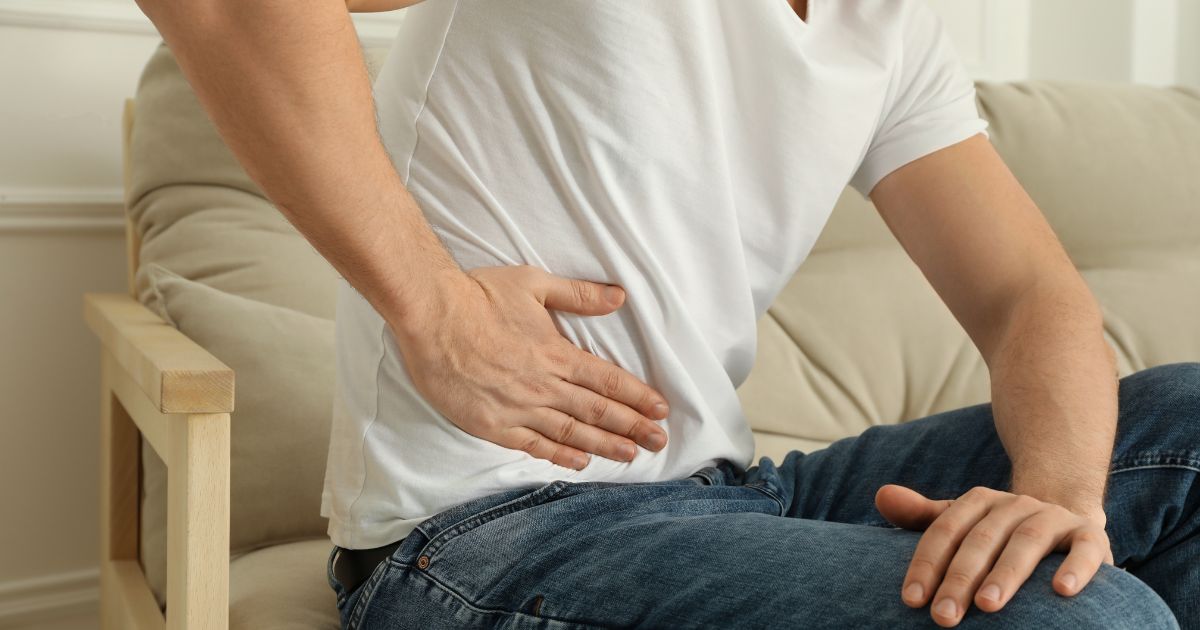Lower abdominal pain can significantly hinder our daily functioning. Whether it's mild or severe, it's important to find ways to effectively relieve it. In this article, we'll first uncover why lower abdominal pain troubles not only women but also men, and then we'll introduce what helps alleviate it.

Why Do I Have Lower Abdominal Pain?
You shouldn't overlook lower abdominal pain because it can indicate a more serious health problem. Once you feel lower abdominal pain, try to determine what's causing it. The treatment will then depend on the cause.
Causes of Lower Abdominal Pain
There are several different causes of lower abdominal pain. Some occur only in women, some only in men, and others are common to both genders.

The most common problems include:
- Menstruation – Many women suffer from abdominal cramps during their menstrual cycle. Learn what helps with painful menstruation.
- Constipation – When stool cannot pass through the intestines, you may experience abdominal pain in the left lower abdomen.
- Urinary tract infections – With the onset of winter, women are particularly prone to developing urinary tract infections and inflammation. These manifest as abdominal pain. Read our article on what helps with urinary tract infection.
- Appendicitis – Pain in the right lower abdomen is often a sign of appendicitis. If left untreated, it can lead to catastrophic scenarios.
- Genital infections – Inflammatory diseases of the genital organs are caused by microbes and yeasts that can spread further through sexual intercourse. Affected individuals suffer from lower abdominal pain during sex and feel burning during urination.
- Uterine fibroids – Lower abdominal pain and irregular menstruation may be caused by fibroids that have formed in the uterus. Their formation is influenced by genetics, hormones, and growth.
- Endometriosis – The term refers again to gynecological conditions in women. It manifests as lower abdominal pain during sex and urination.
- Irritable bowel syndrome – You can recognize irritable bowel syndrome by lower abdominal pain and constant alternation between constipation and diarrhea.
- Musculoskeletal disorders – Lower abdominal pain can also be caused by overloading the psoas and iliacus muscles or problems with the pubic symphysis during pregnancy.
Pain in the Lower Abdomen in Women
Women often experience mild abdominal pain mainly due to the menstrual cycle. It commonly occurs just before menstruation and indicates that everything is functioning normally in the body.
Lower abdominal pain without menstruation is also not uncommon, especially if it's due to ovulation. Hormones responsible for egg production can specifically cause it.
However, sometimes mild pain can escalate to cramps. In such cases, it's advisable to consult a doctor to determine if there's any underlying cause other than the aforementioned endometriosis or fibroids.
If you experience lower abdominal pain during pregnancy, it's usually not serious. It's often due to the growth of the fetus and stretching of the uterus. However, if the pain persists for a long time and is accompanied by fever, dizziness, burning during urination, or even vaginal bleeding, seek medical assistance.
Tip: What Helps with Menstrual Pain? Read on the blog.
Pain in the Lower Abdomen in Men
Pressure in the lower abdomen in men is most commonly due to appendicitis, as mentioned earlier. However, it can also be caused by stomach ulcers associated with abdominal pain before and after meals.

Dull pain in the lower abdomen may again indicate appendicitis, accompanied by vomiting and fever. However, men may also suffer from other problems such as testicular inflammation and enlarged prostate.
Testicular inflammation manifests not only as lower abdominal pain but also with fever and pain during intercourse. Unfortunately, surgical intervention is inevitable. Enlarged prostate affects older age groups and is characterized by frequent urination and incontinence.
Pain in the Lower Abdomen in Children
For newborns and infants, trapped gas is often the cause of lower abdominal pain. Older children may suffer from digestive issues, inflammations, constipation, and other problems. Don't underestimate their occurrence; take your children to a pediatrician.
How to Relieve Lower Abdominal Pain?
If you're dealing with only mild pain, remedies such as magnesium or the tips below may help.
If you haven't tried warm compresses yet because it seems too simple to be effective, reconsider. They can help relax muscle tension and alleviate the uncomfortable lower abdominal pain.
Herbs also play a role in pain relief. Prepare peppermint or chamomile tea, which has anti-inflammatory effects and contributes to blood circulation. Additionally, it keeps the body hydrated, which is essential for proper digestive system function.
If the lower abdominal pain doesn't subside and worsens, associating with other health issues, definitely visit a medical clinic. A doctor will conduct thorough examinations to reveal a possibly more severe cause of your pain.

Tip: What Helps Against Urinary Tract Infection? Learn on the blog.
Preventing Lower Abdominal Pain: How Magnesium Helps
The cornerstone of preventing lower abdominal pain is a healthy lifestyle. Incorporate regular exercise into your life, maintain a balanced diet, and ensure you get enough sleep. All of this can greatly contribute to improving both digestive and hormonal systems.
Magnesium can assist with sleep quality, additionally supporting cognitive brain processes and muscle function. It's often lacking in our bodies, so make sure to replenish it regularly. Don't hesitate to opt for highly effective magnesium supplements.
#produkty#https://www.nanospace.store/search/?string=magnesium
Tip: Magnesium Deficiency – Causes, Symptoms, and How to Supplement It? Find all the information on our blog.
Try to avoid stressful situations that can exacerbate lower abdominal pain. Once again, magnesium can help. It facilitates nerve signal transmission and relieves muscle tension. Additionally, it affects the immune system and inflammation in the body.
Preventing sexually transmitted diseases involves thorough hygiene and protected sexual intercourse.
We must not forget about regular preventive check-ups with a doctor, which can help detect any issues early.
Frequently Asked Questions
Where is the lower abdomen?
The lower abdomen is the part of the body located between the chest and the pelvic region. It lies below the diaphragm and between the hips.
What organs are in the lower abdomen?
The lower abdomen contains many organs, including the stomach, intestines (both small and large intestines), spleen, liver, gallbladder, kidneys, and bladder within the pelvic area. In women, there are also reproductive organs – ovaries and uterus.
What does lower abdominal pain mean?
Severe pain and stabbing sensations in the lower abdomen can be signs of a serious health problem. Do not ignore prolonged pain and seek medical help to determine appropriate treatment.
What Causes Lower Abdominal Pain?
Lower abdominal pain has several causes. Most commonly, abdominal pain is caused by menstruation, constipation, appendicitis, inflammation of the reproductive organs, or urinary tract infections.
What Is on the Left Side of the Lower Abdomen?
On the left side, there are intestines and kidneys, and in women, also ovaries and a portion of the uterus.
Sources
- FLASAR, Mark H.; CROSS, Raymond; GOLDBERG, Eric. Acute abdominal pain. Primary Care: Clinics in Office Practice, 2006, 33.3: 659-684.
- CAPPELL, Mitchell S.; FRIEDEL, David. Abdominal pain during pregnancy. Gastroenterology Clinics, 2003, 32.1: 1-58.
- GRAFF IV, Louis G.; ROBINSON, Dave. Abdominal pain and emergency department evaluation. Emergency medicine clinics of North America, 2001, 19.1: 123-136.
- SANSON, Tracy G.; O'KEEFE, Kelly P. Evaluation of abdominal pain in the elderly. Emergency Medicine Clinics, 1996, 14.3: 615-627.
- AMERICAN ACADEMY OF PEDIATRICS SUBCOMMITTEE ON CHRONIC ABDOMINAL PAIN, et al. Chronic abdominal pain in children. Pediatrics, 2005, 115.3: e370-e381.

